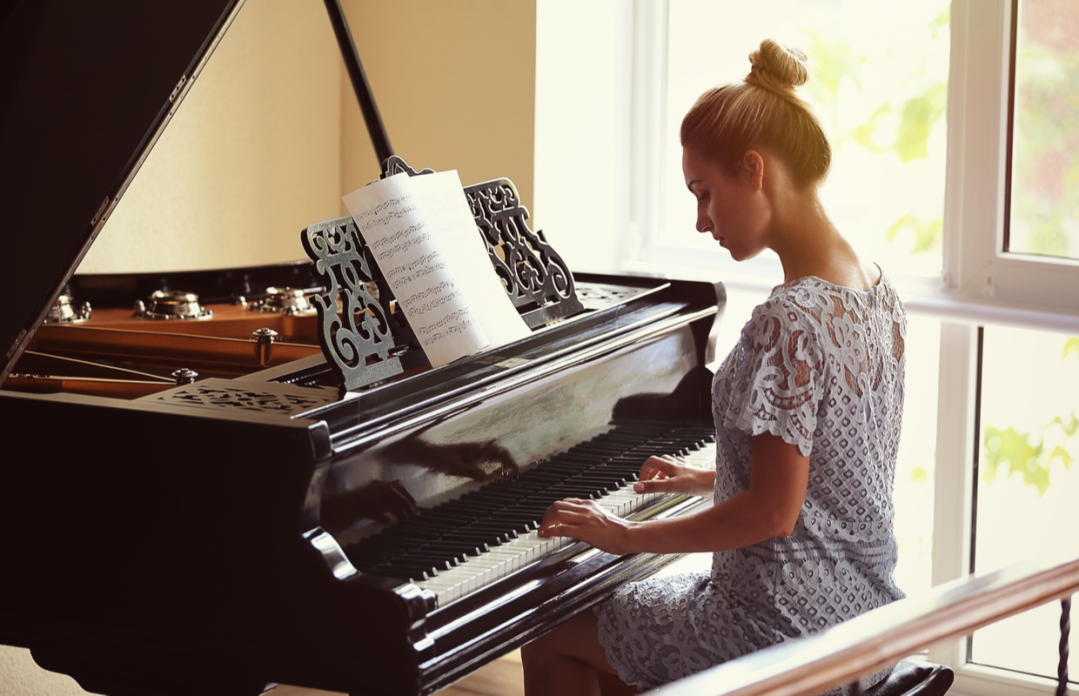Stress relief music: how to reduce anxiety
If you need stress relief, playing an instrument or listening to music is one of the best ways to reduce anxiety and find mindfulness...

Rachel Chalmers struggled with anxiety until she learned to play an instrument. Through music, she found a gateway to stress relief and mindfulness…
When stress strikes, many people find relief through music. My introduction to music was the Spice Girls, whose feel-good song Wannabe blared through my mum’s car stereo just before my seventh birthday and instantly lifted my mood. I was soon playing the band’s songs on repeat, begging my mum to let me try my hand at a musical instrument, so I could work toward my fantasy of one day sharing a stage with Victoria Beckham.
Piano teachers were scarce in our area, so I had no choice but to learn from an unsmiling one who instructed me to play cliched beginner’s pieces, scolded me when I struck the wrong key and punished me with extra practice on her basement piano. Somewhere in my subconscious, my passion for music still flickered and, in my early 20s, it was brought back to life.
Finding stress relief through music
I was navigating a period of profound anxiety, feeling isolated, agitated and – so I thought – without hope. Reaching for a lifeline, I typed ‘meditation music’ into my laptop search bar and stumbled upon a YouTube video of a harpist playing Ludovico Einaudi’s Fly.
As if by magic, I felt my worries escape me. Listening to this music was unlike any stress relief I’d experienced, and I watched as the harpist plucked the strings to create one of the most beautiful, moving and healing melodies I’d heard.
Feeling exhilarated, I clicked through videos of everything from Russian harpists playing expert arrangements with ease and Celtic musicians strumming electric harps to amateurs covering their favourite pop songs. After falling down a rabbit hole of harp videos, I thought: I must learn to play.
Music: the ultimate mindfulness tool
Days later, I was knocking on the door of one of Sydney’s most talented harpists for my first lesson. She greeted me with a warm smile, led me to a room filled with gilded harps and played a piece she had been practising for her forthcoming performance at the Sydney Opera House.
She explained that music became her stress relief and emotional escape from an early age; for her, it is the ultimate mindfulness tool. It brings her into the present moment, gives her a goal to work towards and shows her a beauty that nothing else can. She hoped the same would be true for me, and she handed me a book of Irish harp tunes that she felt would best kickstart my journey.

Music lesson and therapy session
I’d never felt so inspired and, as I hugged her orchestral harp to play it for the first time, I knew I was hooked – focusing on technique, note reading, rhythm and the sound of ringing harp strings occupied all my mental bandwidth.
As I stepped out of her studio and headed home to practise on my rented harp, I realised I hadn’t remembered my struggle with anxiety for the entire 60-minute lesson. I soon understood that my first harp lesson was more than a lesson in music; it was a lesson in mindfulness. What yoga teachers, psychologists and Instagram ‘lifestyle gurus’ had struggled to accomplish, my harp teacher had done in one hour-long session.
She encouraged me to practise plucking the harp strings as precisely as possible while enjoying the sound they create. She emphasised the importance of repetition, not only to learn the notes but to become fully entwined with the chords.
And, most of all, she implored me to forget about perfection, to experiment with my own variations and to celebrate the memories, sensations and emotions each practice evokes. She may not have known it, but she had provided a sort of therapy that I hadn’t found elsewhere. And she isn’t the first to recognise music’s therapeutic benefits, like stress relief.
How does music help with stress relief?
Music has often been used in clinical settings to reduce pain, ease muscular tension and relieve symptoms of anxiety. Beyond physical comfort, music quietens the mind profoundly – echoing my harp teacher’s beliefs, renowned British pianist James Rhodes touts music as one of the most powerful modes of healing.
After a traumatic childhood, Rhodes used music as a form of stress relief and meditation. He believes ‘anything that we can find that makes things a little bit happier, a little bit better, we have to grab with both hands. Music is one thing that does that.’
Like Rhodes, since reawakening my passion for music, I too have grabbed hold of it with both hands, and I haven’t released my grip. Now, when I’m struck by pangs of anxiety, I immediately abandon the task at hand and turn to the 25 kilogram instrument sitting in the corner of my living room. As I translate written music with my fingers to create soothing sounds on strings, I feel a welcome wave of calm wash over me.
Music and meditation
When my mind is particularly cluttered, repeating the same bar, performing basic arpeggios or experimenting with different chords gives me the same sort of enlightened clarity I imagine Buddhist monks achieve while meditating in the Himalayas, all in the comfort of my own home.
Not only has music provided me with moments of relief from a long-time struggle with stress and anxiety, but it has also been a gateway to other forms of meditation. For me, music was the way in; it’s the tool that taught me to open my eyes and focus on the here and now. It engages the ears, captivates the mind and encourages the musician or listener to be present.
It has also shown me to tune into my surroundings – each time I step outside my house, I now take mental note of the feeling of the air on my skin, the sounds of everyday life and the colours in neighbours’ gardens. Rather than living in an imaginary world based on days in the future, I take time to notice the beauty right in front of me.
Stress relief on-the-go
As I’ve continued to explore music, I’ve used it as a weapon against my most agonising anxiety symptoms. When I experienced my first panic attack a decade ago, it felt as if my world had stopped. The mere thought of enduring another attack was so terrifying that it kept me locked in the safety of my home where I believed panic couldn’t touch me.
But music helped me broaden that space; it was a comfort that I could take with me wherever it was needed. Now, as soon as I feel a twinge of stress or panic, I pop in my earphones, close my eyes and turn my attention to the entrancing electronic music of Flume, or the modern classics of Philip Glass and, without fail, I find relief as my panic drifts away.

3 ways to use music for stress relief, mindfulness and meditation
No matter your mood, find relief from stress and allow music to bring you into the present moment with these simple steps towards mindful meditation…
1. Listen to a song that speaks to your emotions
Whether that means listening to Christmas carols, your favourite tunes from school or one of the Tchaikovsky’s symphonies, use music to engage your ears and awaken joyous memories.
2. Learn an instrument
Unleash your inner child and give yourself permission to finally learn that instrument you’ve had your eye on since you were young. Experiment with your own melodies and enjoy the sound created by your own two hands.
3. Immerse yourself in music
Celebrate the feelings evoked by your music, whether you’re the musician or listener. Turn up the volume on your sound system and pay close attention to the way the beats, instruments, voices and lyrics interact with your own thoughts and feelings.





